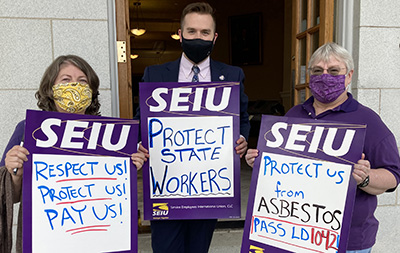Bargaining News
|March 8, 2023
To take a State job means less pay that erodes more each year

MSEA-SEIU Member Cynthia Oakes, at left, is shown in during the 130th Maine Legislature with former Maine House speaker Ryan Fecteau and MSEA-SEIU past president Ramona Welton. On Feb. 22, 2023, Cynthia, who works as a planning and research associate for Maine DHHS, gave the testimony below on her own time to the Legislature’s Appropriations and Health and Human Services committees in support of ending the State Employee Pay Gap:
Senator Rotundo, Senator Baldacci, Representative Sachs, Representative Meyer, and members of the Committees on Appropriations and Financial Affairs and Health and Human Services,
My name is Cynthia Oakes, I live in Augusta, and I’m testifying on my own personal time. I work at the Department of Health and Human Services as a Planning and Research Associate and I have been working for the State for 29 years.
When I first returned to work after having my kids, I made more per hour as a temp worker than equivalent State positions paid. But full-time work, permanent hours, health insurance, and paid time off made up for the difference in pay.
As time went on, inadequate cost of living increases, mandatory shutdowns, early close on Fridays, and freezes on merit increases meant I was falling further behind.
I worked hard and furthered my education and training so I could advance in my career. I started as a Clerk Typist II with a pay range of 8, and currently I am a Planning and Research Associate at pay range 23. At each step of the way my pay has lagged behind the private sector, but more flexible time off was important to me while raising my family. At times I worked a part time second job.
There have been two pay studies in my almost thirty years with the State and each has shown that there is a pay gap. The first study completed the Administrative group, and they all got a pay increase. Just after that study, my hard work and new skills got me a job in the Professional & Technical bargaining unit. Improving myself meant I made less than my previous position and the rest of the pay study was dropped before completion.
I recently sat on two interview panels where we were down to one candidate for each position before we even scheduled the interviews. The reason each candidate gave for declining was pay. Fortunately the other candidates were well qualified and are working out. One of the two later told me that she was offered $8000 more for a private sector job but needed the flexible schedule we offered. To take a State job means less pay that erodes more each year. We can’t continue to rely on attracting good workers by offering flexible hours. Especially when there is a shortage of workers.
Once my children were grown, I once more reviewed my priorities. Having worked under both Social Security and State retirement system (MainePERS) I did a little research and because I did not have enough working years left to avoid the Windfall Elimination offset, and because my part time jobs were low paying, it made more sense to continue my career with the State. Now at sixty six years old I am still working because each year adds 2% to my retirement income. I am so lucky to be healthy and able to do this.
I am proud to work for the people of Maine. Proud of my work. Proud of all the skills I learned and applied to my work and life. Proud of my coworkers. I hope to continue to be proud of those who work for the State, but I believe we have reached the point where we will no longer be able to attract the people we need with just flex time to balance offers of higher pay. The State needs to take steps to close the pay gap and ensure that all workers are being compensated well for the important work they do.
Without an investment in our state workers, we will continue to face recruitment and retention problems, and they’ll likely get worse in the future.